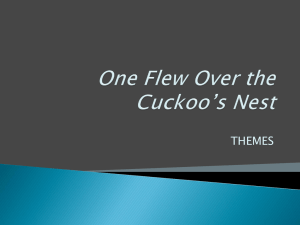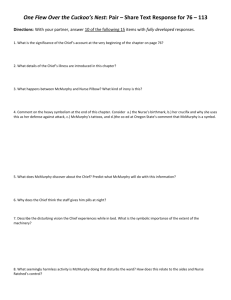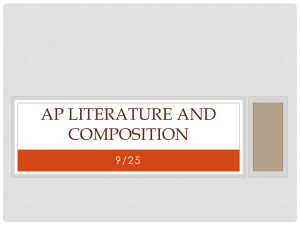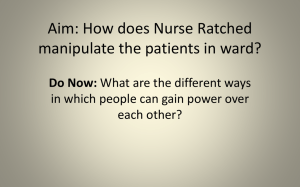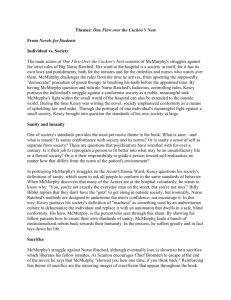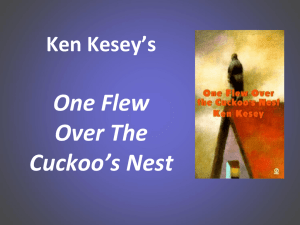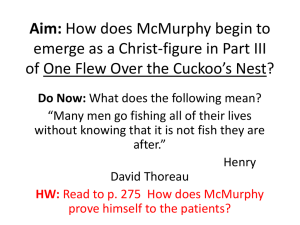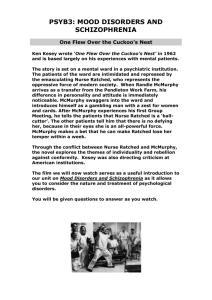One Flew Over the Cuckoo`s Nest
advertisement
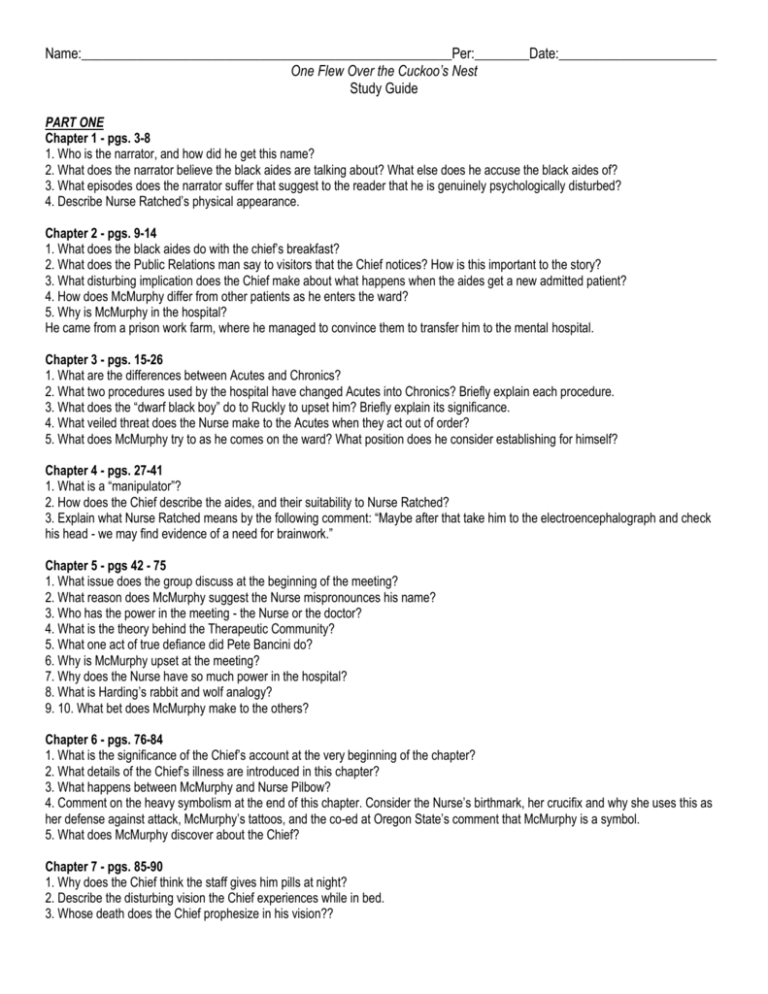
Name:______________________________________________________Per:________Date:_______________________ One Flew Over the Cuckoo’s Nest Study Guide PART ONE Chapter 1 - pgs. 3-8 1. Who is the narrator, and how did he get this name? 2. What does the narrator believe the black aides are talking about? What else does he accuse the black aides of? 3. What episodes does the narrator suffer that suggest to the reader that he is genuinely psychologically disturbed? 4. Describe Nurse Ratched’s physical appearance. Chapter 2 - pgs. 9-14 1. What does the black aides do with the chief’s breakfast? 2. What does the Public Relations man say to visitors that the Chief notices? How is this important to the story? 3. What disturbing implication does the Chief make about what happens when the aides get a new admitted patient? 4. How does McMurphy differ from other patients as he enters the ward? 5. Why is McMurphy in the hospital? He came from a prison work farm, where he managed to convince them to transfer him to the mental hospital. Chapter 3 - pgs. 15-26 1. What are the differences between Acutes and Chronics? 2. What two procedures used by the hospital have changed Acutes into Chronics? Briefly explain each procedure. 3. What does the “dwarf black boy” do to Ruckly to upset him? Briefly explain its significance. 4. What veiled threat does the Nurse make to the Acutes when they act out of order? 5. What does McMurphy try to as he comes on the ward? What position does he consider establishing for himself? Chapter 4 - pgs. 27-41 1. What is a “manipulator”? 2. How does the Chief describe the aides, and their suitability to Nurse Ratched? 3. Explain what Nurse Ratched means by the following comment: “Maybe after that take him to the electroencephalograph and check his head - we may find evidence of a need for brainwork.” Chapter 5 - pgs 42 - 75 1. What issue does the group discuss at the beginning of the meeting? 2. What reason does McMurphy suggest the Nurse mispronounces his name? 3. Who has the power in the meeting - the Nurse or the doctor? 4. What is the theory behind the Therapeutic Community? 5. What one act of true defiance did Pete Bancini do? 6. Why is McMurphy upset at the meeting? 7. Why does the Nurse have so much power in the hospital? 8. What is Harding’s rabbit and wolf analogy? 9. 10. What bet does McMurphy make to the others? Chapter 6 - pgs. 76-84 1. What is the significance of the Chief’s account at the very beginning of the chapter? 2. What details of the Chief’s illness are introduced in this chapter? 3. What happens between McMurphy and Nurse Pilbow? 4. Comment on the heavy symbolism at the end of this chapter. Consider the Nurse’s birthmark, her crucifix and why she uses this as her defense against attack, McMurphy’s tattoos, and the co-ed at Oregon State’s comment that McMurphy is a symbol. 5. What does McMurphy discover about the Chief? Chapter 7 - pgs. 85-90 1. Why does the Chief think the staff gives him pills at night? 2. Describe the disturbing vision the Chief experiences while in bed. 3. Whose death does the Chief prophesize in his vision?? Chapter 8 - pgs. 91-101 1. What seemingly harmless activity is McMurphy doing that disturbs the ward? 2. What is the ward policy regarding toothpaste? 3. How does McMurphy inadvertently but happily set Nurse Ratched into fury and against the aides? Chapter 9 - pgs. 102-113 1. How does Nurse Ratched get McMurphy back for the towel incident? 2. What cheerful idea does McMurphy have? 3. What is the importance of the Nurse’s small twitches of the face? When do they occur? 4. How does McMurphy gain the upper hand in this chapter? Chapter 10 - pgs. 114-116 1. Describe what role McMurphy plays in the Monopoly game. How does this comment on his character? Chapter 11 - pgs. 117 - 125 1. What temporary change to the ward schedule does McMurphy propose? 2. Why does McMurphy make the bet to life the hydrotherapy unit? Chapter 12 - pgs. 126 - 127 1. Why does the Chief feel so connected to the painting? 2. Why does the Chief portray the visiting doctor as a skeleton? 3. Explain the irony of the public relations man’s comment: A man that would want to run away from a place as nice as this ... why, there’d be something wrong with him.” Chapter 13 - pg. 128 1. How does the Chief perceive McMurphy’s attempts to drag them “out of the fog”? Chapter 14 - pg. 129 1. Of all the ways a person could kill himself, what is significant about the fact that Old Rawler cut off his own testicles and bled to death? Chapter 15 - 130 - 145 1.What do we learn about the Chief’s past at the beginning of the chapter? 2. What insight do we gain into the Chief’s apparent, but false, deafness and dumbness, and how is EST related to it? 3. 4. What does the Chief say about helping friends? 4. What new vote does McMurphy call? How does Nurse Ratched defeat him? Who saves the vote, and why? 5. How does Nurse Ratched preserve her victory? PART TWO Chapter 1 - pgs. 149 - 158 1. With the opening of Part 2, how has the balance of power changed on the ward? 2. What is the Chief afraid of now? Why? 3. How does the extent of Nurse Ratched’s great power in this hospital show itself in the staff meeting? Chapter 2 - pgs. 159 - 166 1. How does McMurphy’s behavior positively affect the Chief’s mental illness? 2. What important experience does the Chief have when he wakes up at night? What happens to the dog, and how is this significant? 3. What symbolic meaning does the Chief attribute to the nurse with the birthmark on her chest? How does this comment on the conflict between society and nature? Chapter 3 - pgs. 167-175 1. Why is the dorm room locked on weekends? How does McMurphy use this to criticize the therapy? 2. What complaint does Cheswick raise about another of Nurse Ratched’s use of power? How does she explain this, and how valid is this explanation? How is this affected by her reputation of abusing power? 3. What is ironic about the lifeguard, considering why he is there and the importance of his job? How did he get there in the first place? How long had he spent there? Assess the validity of this. 4. What sobering, even frightening, fact does McMurphy learn? How does he adjust his behavior? How do the other patients react towards this? 5. What happens to Cheswick? For you lifesavers and lifeguards out there, how could this have been avoided (if you don’t know, find out!)? How does this comment on the quality of the staffing at the hospital? Chapter 4 - pgs. 176-180 1. What happens to Sefelt at the beginning of the chapter? Why does this happen, and why does Sefelt insist on doing what he does? How does Nurse Ratched exploit this event to her own ends? 2. What is Scanlon’s comment, and how does it relate to McMurphy? Chapter 5 - pg. 181 1. What is the essence of this short chapter? Chapter 6 - pgs. 182-187 1. How does the design of the library, with rickety bookshelves and disorganized books comment on society’s body of accumulated knowledge? 2. What is Harding’s wife’s name? What insinuation does Harding’s wife make about his friends? 3. At this point in the novel, what can the reader extrapolate about Harding’s supposed “illness”? Is this an illness worthy of treatment in this hospital? Why is Harding voluntarily in this hospital to treat this perceived illness? 4. After Vera leaves, how does McMurphy fail to emotionally support Harding in the way Harding expects? What is McMurphy really thinking about here? 5. What was hydrotherapy? Does it seem to have had the ability to work, or did it appear to just be a fancy method of appearing to address mental illness? In the Chief’s opinion, who benefited the most from it? 6. In the earlier Monopoly game, McMurphy most patiently endures Martini’s hallucinations and keeps him in the game. In what way does McMurphy act differently toward Martini at the end of this chapter, and why? Chapter 7 - pgs. 188-196 1. What irony does Sefelt observe about the use of EST? What is the origin of EST, as Harding explains it, and why is this also ironic? What does McMurphy compare it to? 2. What is the significance of Harding’s comment, “Frontal-lobe castration”? Who appears to make the decision to use this procedure, and why does that seem out of order? 3. Compare the following two passages, one by The Chief, and one by Simon in Lord of the Flies, by Sir William Golding. What is similar about their thematic implications? The Chief: “McMurphy doesn’t know it, but he’s onto what I realized a long time back, that it’s not just the Big Nurse by herself, but it’s the whole Combine, the nation-wide Combine that’s the really big force, and the nurse is just a high-ranking official for them.” Lord of the Flies: (Simon) “maybe there is a beast .... maybe it’s only us.... Simon 4. What does McMurphy learn about his own status in the hospital compared to the others? What is so shocking about this? What is the others’ explanation? How does McMurphy accept this? Chapter 8 - pgs. 197-201 1. What privilege does Nurse Ratched revoke, and why? Is this justified? 2. What defiant act does McMurphy do? What is the symbolic importance of the glass? What is McMurphy’s message? What effect does this have on the men? PART THREE Chapter 1 - pgs. 205-224 1. How is Dr. Spivey affected by McMurphy towards Nurse Ratched? 2. What does McMurphy do when Nurse Ratched turns down his request for an accompanied pass? What grounds did Nurse Ratched cite for her refusal? 3. What happens in the basketball game against the aides? In what respect do the patients gain victory? 4. How does basketball end? Who is responsible? 5. What is McMurphy’s next plan? How does Nurse Ratched try to undermine it? Why doesn’t the Chief sign up? 6. Describe the visit the Chief remembers from his youth. Discuss each of the three visitors in terms of their job, their opinion of Indians, and how they treat Chief Bromden (as a child). How does the Chief, as a boy, try to get the better of them? What results from this? Why is this important to the novel? 7. What does Sam the side find? Why does McMurphy confront him? What does McMurphy do for the Chief? 8. What surprise does the Chief give McMurphy? What does McMurphy learn about the Chief’s self-image? 9. What warning does the Chief give McMurphy? 10. Why does the Chief want to touch McMurphy? Is this a homosexual incident? Chapter 2 - pgs. 225-258 1. What surprise do they aides find about the fishing trip? What is ironic about their reaction? 2. Who is McMurphy’s final member of the crew? How is this fortuitous? What is this man’s condition, and how does McMurphy assuage his fears? 3. What is Candy’s occupation? What effect does she have on the patients? Who is affected the most? 4. How does Nurse Ratched try to foil the trip? What money issue doe Nurse Ratched raise? What is the truth of that and why doesn’t McMurphy protest? How does McMurphy avert disaster? 5. How do the men initially react to being outside the hospital? 6. How do the service station men take advantage of Dr. Spivey? How does McMurphy turn it around? What irony does Harding observe about this interaction? 7. What signs of the Combine does the Chief see? Are these appraisals accurate? 8. What problem does the group face as they arrive at the dock? How does McMurphy overcome this? How do the patients (other than McMurphy) handle the harassment Candy receives from the other men at the dock? 9. Comment on Martini’s observation of the deep: “‘Oh. Oh, my God,’ he said, but whatever he saw was too deep for the rest of us.” Is Martini a visionary? Is he mentally ill, or is he a prophet? How might one judge? 10. How does McMurphy react when the group, including the doctor, call him for help? Why does he act this way? What observation does the Chief make about McMurphy’s reaction, and how is this insightful about McMurphy and society? 11. Suggest a symbolic explanation for McMurphy tying two chunks of meat to the ends of a four foot string and throwing the string and meat into the air, where two birds fight over it, McMurphy saying. “Till death do them part”. 12. Why does McMurphy not volunteer to go without a lifejacket? Who does volunteer? Does this accomplish McMurphy’s desired effect? 13. Who catches the big fish? Why is it important that he refuses help? 14. How does Dr. Spivey’s empowerment manifest itself when they return to the dock? How does he overcome the police and boat owner? 15. What does everyone learn about George? How do the dock men treat them now, and why is this important? 16. What does McMurphy think is Billy’s problem, and what arrangement does he make to solve it? 17. What alarming observation does one of the Acutes make about McMurphy? What is the cause for this? 18. What is the story behind the dress in the tree? What does the dress symbolize? 19. What disturbing detail does the Chief notice about McMurphy? What is its cause? What does McMurphy telling the story in the car while the men fall asleep resemble? PART FOUR Chapter 1 - pgs. 261-275 1. What plan does Nurse Ratched put into operation after the fishing trip? Is Nurse Ratched telling the truth? Why does McMurphy petition to have a letter sent to Washington about Electro-Shock Therapy and lobotomies? What other reforms does McMurphy attempt? Who assists in these attempts, and why? 2. How does Nurse Ratched succeed in planting her idea in the patients’ minds? Why is this questionable? 3. How does McMurphy inadvertently alienate Billy Bibbitt? How does this act reflect Nurse Ratched’s accusations? 4. How does McMurphy upset the Chief? How is the Chief’s accusation ironic? 5. How does Nurse Ratched punish the men for attending the fishing trip? Why is this act not a legitimate one? How do the men treat the aides? How do the aides regard this behaviour, and who do they blame? Who stands to suffer the most from this punishment? What does the image of this punishment resemble? 6. How does McMurphy prove Nurse Ratched wrong? What does this incident prove about the aides? How does McMurphy prevail, and how is it consistent with his character? How does the conflict escalate? How does the Chief get involved? How does the men consider this a victory? How is it really the opposite? How has the Chief actually lost in this? Chapter 2 - pgs. 276-288 1. Explain the significance of the following excerpt: “There’s a singed smell of men scared berserk and out of control, and in the corners and under the Ping-Pong table there’s things crouched gnashing their teeth that the doctors and nurses can’t kill with disinfectant.” 2. Where have McMurphy and the Chief been sent? How does the Japanese nurse treat them, and how is this a sharp contrast to Nurse Ratched? How do the Japanese nurse’s question reveal that Nurse Ratched and the aides aren’t deceiving everyone? What does the Japanese nurse say about Nurse Ratched, and why the men won’t be able to stay long? What does this reveal about Nurse Ratched’s capability for vengefulness? 3. What is the importance of the stark contrast between McMurphy / the Chief and the other patients on the Disturbed ward? 4. Why are the two black aides grinning when they attend the Disturbed ward? 5. How does Nurse Ratched employ EST? What does she ask McMurphy to do? How does he respond? To what does he compare Nurse Ratched’s tactics? 6. What sacrifice does McMurphy make? Why? What is his sacrifice remiscient and symbolic of, along with the following comment? “Anointest my head with conductant. Do I get a crown of thorns?” 7. While enduring the EST, what memory does the Chief recall? What is the significance of names? When recalling his grandmother’s rhyme, why does he especially like the goose who flies over the cuckoo’s nest? What is the meaning of “goose swoops down and plucks you out”? 8. Consider the extended metaphor of gambling after the Chief’s EST. What is the nature of it? Who are the principal players in this scenario? How does this foreshadow the ending? 9. What considerable victory does the Chief attain at the end of the chapter? How does it vindicate McMurphy, in spite of all the losses? Chapter 3 - pgs. 289-309 1. How does Nurse Ratched continue her reign of terror against McMurphy? How does McMurphy respond to her each time? What does the doctor do when McMurphy pinches Nurse Ratched’s bum, and why? How does McMurphy act when he is called to go for the next EST treatment? 2. As McMurphy resists the EST torture, what is Nurse Ratched planning when she asks if “more drastic means might be required to make contact with him”? 3. What plan do the patients hatch for McMurphy? Why does he refuse for the time being? How does this add to his characterization? 4. How does McMurphy sneak Candy and the other girl into the ward? What price is expected for this act, and how does this comment on society and human nature? How does Billy demonstrate his naiveté? 5. Who interrupts the party, and why? How does Turkle handle it? Who helps Turkle, and how does this add to the idea of empowerment? 6. What do the men discover about their files in the Nurses’ station? How does McMurphy’s reaction comment on societal management of mental illness? 7. Comment on the dramatic and thematic importance of Harding’s insightful jest: “Most merciful God, accept these two poor sinners into your arms. And keep the doors ajar for the coming of the rest of us, because you are witnessing the end, the absolute, irrevocable, fantastic end. I’ve finally realized what is happening. It is our last fling. We are doomed henceforth. Must screw our courage to the sticking point and face up to our impending fate. We shall be all of us shot at dawn. One hundred cc’s apiece. Miss Ratched shall line us all against the wall, where we will face the terrible maw of a muzzle-loading shotgun which she has loaded with Miltowns! Thorazines! Libriums! Stelazines! And with a wave of her sword, blooie! Tranquilize all of us completely out of existence.” 8. What does the Chief realize about their freedom and the power of the Combine? Is he right? 9. What plan does Harding hatch to deal with the aftermath of their party? How does Harding demonstrate humanity and kindness? What is ironic about the fact that the police can’t be bothered to chase down escaped mental patients? 10. Why does the Chief volunteer to stay behind, instead of escaping with McMurphy? . 11. How does Harding employ euphemism in his explanation of his illness? What exactly is his illness, and how has society created it? 12. What does Harding mean when he says, “‘It is us. He swept his hand about him in a soft white circle and repeated, ‘Us’”. How is his message similar to Simon’s in William Golding's Lord of the Flies? 13. How does the chapter end? Chapter 4 - pgs. 310-325 1. How does Nurse Ratched deal with Turkle? How do the patients act? What subtle act does Turkle carry out in support of McMurphy? What does this say about his character? What is Harding concerned about, and how does McMurphy react? 2. How do the patients react as Nurse Ratched demands information from each of them about Billy’s location? 3. How does Nurse Ratched turn the battle around? What tactic does she exploit when she confronts Billy? 4. What happens to Billy? How does Nurse Ratched react, and how does she relay this to McMurphy? What else does she blame McMurphy for, and is this justified? 5. What does McMurphy do? Why don’t the patients try to stop him? Why don’t the aides try to stop him? Who does stop him? What is the meaning of the final cry McMurphy utters? 6. What do the patients and Dr. Spivey in the hospital while McMurphy and Nurse Ratched are missing? 7. What becomes of McMurphy? How do the patients initially react? What does the Chief know he must do? 8. How does the Chief carry out his task with McMurphy? How does the Chief feel? What does Scanlon say to him, and what must the Chief do? 9. Comment on the meaning of the symbolism in the following excerpt: “The glass splashed in the moon, like a bright cold water baptizing the sleeping earth.” 10. What aspect of McMurphy’s personality has the Chief inherited? How does this fact have spiritual meaning?
